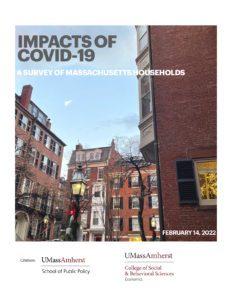Who is a member?
Our members are the local governments of Massachusetts and their elected and appointed leadership.
 Researchers from UMass Amherst examining the effects of the COVID-19 pandemic on Massachusetts households warn that the fallout will produce “possibly irreversible” socioeconomic impacts for households unless there is rapid intervention by policymakers and greater assistance for particularly vulnerable populations.
Researchers from UMass Amherst examining the effects of the COVID-19 pandemic on Massachusetts households warn that the fallout will produce “possibly irreversible” socioeconomic impacts for households unless there is rapid intervention by policymakers and greater assistance for particularly vulnerable populations.
“Impacts of COVID-19: A Survey of Massachusetts Households,” released by the UMass Amherst School of Public Policy on Feb. 14, found that Massachusetts households experienced significant effects on income and careers, child care and educational outcomes, and mental and physical health during the pandemic’s first year.
“If not addressed quickly, these socioeconomic impacts will have lasting, and possibly irreversible, implications for the United States,” said UMass Amherst economist Marta Vicarelli, who led the study. “We hope that our results will inform the design of policies that address these impacts and support vulnerable groups.”
The 116-page report paid particular attention to the pandemic’s effects on women, children and minority populations. It focuses on a range of topics, including employment and financial strains, child care and education, physical and mental health, substance use, and food security. In particular, researchers looked at delays in children’s academic and emotional development, negative mental health outcomes, and negative effects on women’s employment.
Key findings
When broken down by race, income, gender and other factors, the survey results revealed that pandemic disruptions have disproportionately affected people of color, women, children and low-income households. However, the survey generally revealed substantial challenges for households throughout Massachusetts:
• Nearly one-third of respondents (31%) saw decreases in overall income and savings, with women more likely to report having become financially dependent on their partners due to COVID-19 disruptions.
• Nearly three-quarters (72%) of women said they have done more than their partners in supervising their children’s remote learning and other education-related activities during COVID-19.
• Men with children were more likely than women to report decreased productivity in their professional lives (60% and 44%, respectively) or to report having lost their jobs (12% and 9%, respectively) due to COVID-19 disruptions. However, women who responded were more likely to have made changes to support household needs, such as reducing work hours or leaving or changing jobs.
• Three-quarters of respondents with children of preschool to middle-school age indicated that COVID-19 impacts had hindered their children’s academic progress, and 87% of parents of children with special needs believe that their children had lost skills they had gained before the pandemic.
• About six in 10 respondents reported being “quite” to “extremely” concerned about disruptions on their children’s academic achievements due to the pandemic, and more than 70% of parents of children of kindergarten age and older reported being “quite” to “extremely” concerned about their children’s social-emotional development.
• Just over three-quarters of respondents said they had canceled or postponed necessary health appointments, mainly because of concerns about in-person visits or cancellations by health-care providers.
• Parents identified several sources of stress: work (40%), limited access to child care (37%), and supervision of children’s school progress (36%).
• More than one-third of respondents (35%) reported an increase in alcohol consumption, while 45% reported an increase in cannabis use.
• Access to food also affected mental health: 46% of people with low food security, and 76% of those with very low food security, reported moderate-to-severe anxiety and depression, compared with 22% of the general survey group.
Researchers also asked Massachusetts residents what policies and resources would best help them cope with the crisis, and residents identified three top priorities: a one-time stimulus payment (15%), greater mental health support (15%), and more support with child care (13.4%).
The survey was designed and implemented by the Sustainable Policy Lab at UMass Amherst and was distributed online between Oct. 4, 2020, and Feb. 18, 2021. Researchers received 5,916 responses from 54 states and U.S. territories, including 2,617 responses from Massachusetts.
The study also involved researchers from Amherst College and Indiana University, and received support from the MMA, the International City/Council Management Association, the Women’s Fund of Western Massachusetts and the Boston Women’s Fund.